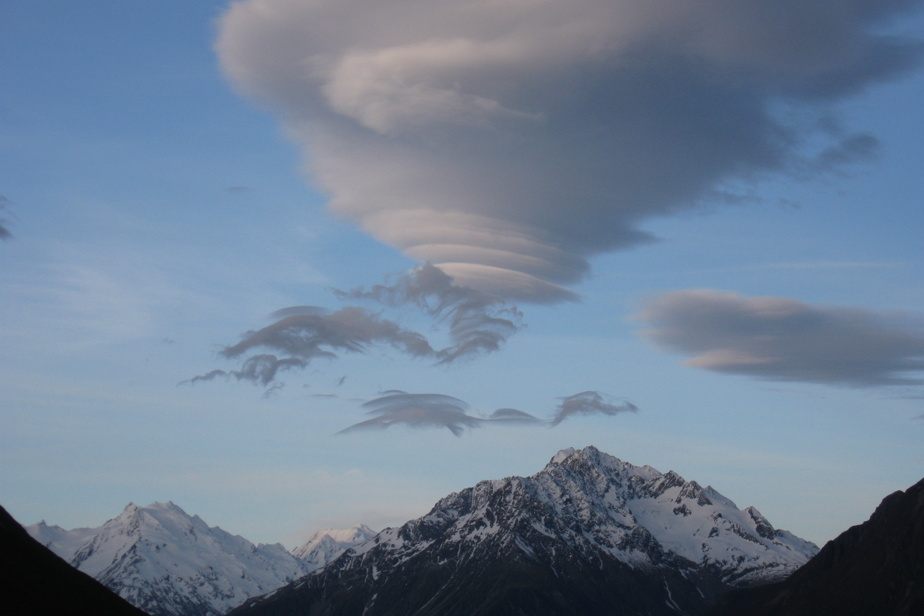(New Zealand) Ah! The Alps ! Impressive peaks, raging torrents, soothing valleys. It is the kingdom of mountaineering, but also of hiking and mountain biking. Picturesque villages allow them to be fully appreciated, such as Wanaka and Mount Cook Village. Yes, we are talking here about the Southern Alps, located on the South Island, in New Zealand.
Mountaineers from all over the world come here to challenge mythical peaks like Mount Cook (Aoraki in the Maori language). But now, the conditions are not always favorable: storms, high winds, avalanche danger. Particularly at the beginning of the austral spring, at the end of November, when I land there. While waiting for the right moment, like many mountaineers, I turn to Mount Cook Village and Wanaka to keep fit and in good spirits.
A short visit to the Aoraki/Mount Cook National Park Visitor Center is a must to first learn about the geology, fauna, flora and history of mountaineering in the region. Then, to chat with the friendly employees, a question of making a choice among the many hiking trails in the park.
I opt for the most popular trail, the one that joins Hooker Lake. It is a hike accessible to all: it has very little elevation gain, but remains interesting thanks to a series of suspension bridges. The arrival at Hooker Lake does not disappoint visitors despite the somewhat chagrin weather. Hooker Glacier dumped some pretty little icebergs here as the clouds begin to part, revealing snow-covered Mount Aoraki.
The next day, the weather improves, I have ants in my legs. So I tackle the Sealy Tarns trail (a tarn is a small mountain lake). To reach the belvedere, which offers a bird’s eye view of the glaciers and moraines, you have to climb 2200 steps. I do not count them, I rely on the figure given by the national park. My tired legs confirm to me that it should be about that.
In the afternoon, I find the energy necessary for another vigorous climb towards Red Tarns.
The avalanche danger is still too high at altitude. I’m considering my options. I could rent a bike to visit the other big valley in the park, the Tasman Valley. I could also join a kayaking trip on Lake Tasman and get up close to the little icebergs that float here and there. I could also afford a helicopter flight over the Tasman Glacier. Some tours, obviously more expensive, include a landing on the glacier and a short walk in this unusual environment.
I decide instead to go climbing on a very beautiful wall near the village. A small group is also on site as part of an initiation trip organized by the company Alpine Guides (Aoraki), whose offices are located in the middle of the village.
In the afternoon, I take advantage of a slightly more gloomy weather to visit the Sir Edmund Hillary Alpine Centre, housed at the Hermitage Hotel. This is a small museum focusing on the life of Sir Edmund Hillary, the first man to summit Everest, as well as the history of mountaineering and tourism in the Mount Aoraki region. The cinema in the center offers a series of films on these subjects, something to rest after all these hikes. In particular, there is a fascinating documentary on the search and rescue operations on Mount Aoraki, which reminds us that it is really not a good idea to go for a walk up there when the conditions are not favorable.
Precisely, the conditions are not improving. My guide suggests that I go to the village of Wanaka to have access to a new series of outdoor activities.
Instead, I rent a kayak to follow the banks, say hello to the cormorants and grebes, then visit small Ruby Island, where the wildflowers abound. On the way back, I pass by the famous “Wanaka tree”, a twisted tree that grows in the water, near the beach. It probably ended up on hundreds of thousands of Instagram accounts.
The arms have worked, it’s the turn of the legs. So I rent a bike to explore the surroundings, first following the shores of Lake Wanaka, then those of the Clutha River. It’s a pretty trail, wide at first and lined with a mass of pink, purple, and mauve lupines, then narrow, alternating between the water’s edge and wooded sections.
On the way back, I treat myself to Patagonia Creamery for a serious dark chocolate ice cream, a local classic.
There is also rock climbing to do near Wanaka, but it rained overnight and the walls are not yet dry. So we opt for the most popular hike in the area, Roys Peak. It should not be underestimated: the trail is 16 kilometers long, it has an altitude difference of 1300 m. But don’t be afraid either: the trail is wide and climbs in long switchbacks between some cute cows and lambs. The summit has a little alpine vibe and offers a spectacular view…if the clouds are cooperative. Which is not completely the case this afternoon.
I know a good way to console myself: end the day at Cinema Paradiso. The latest novelties are presented in small, pleasant rooms equipped with sofas and armchairs. By paying for your place, do not miss to reserve one of the large cookies that the employees bake during the first half of the film. At the intermission, the hot, steaming biscuit awaits you. It’s happiness.















